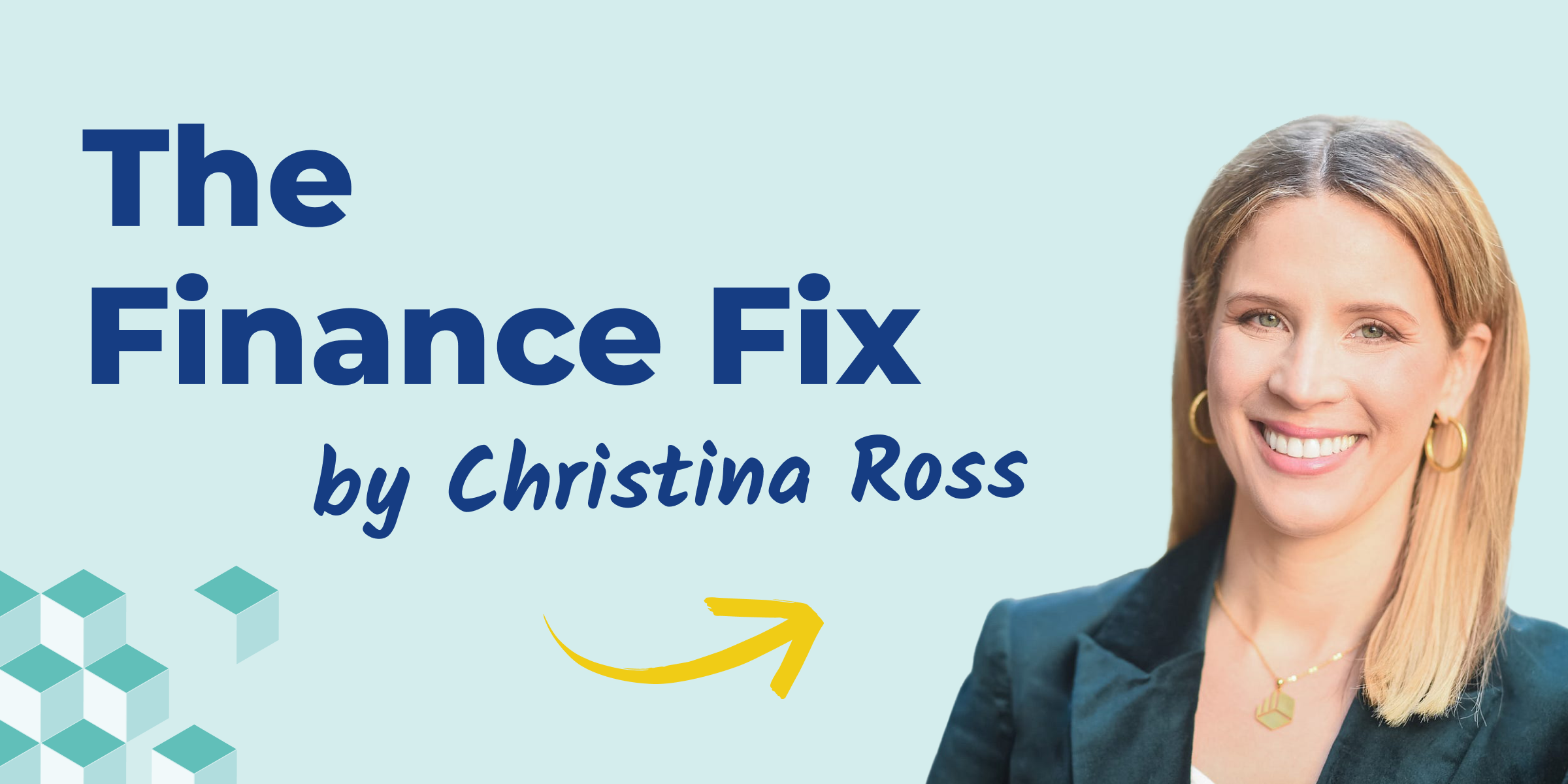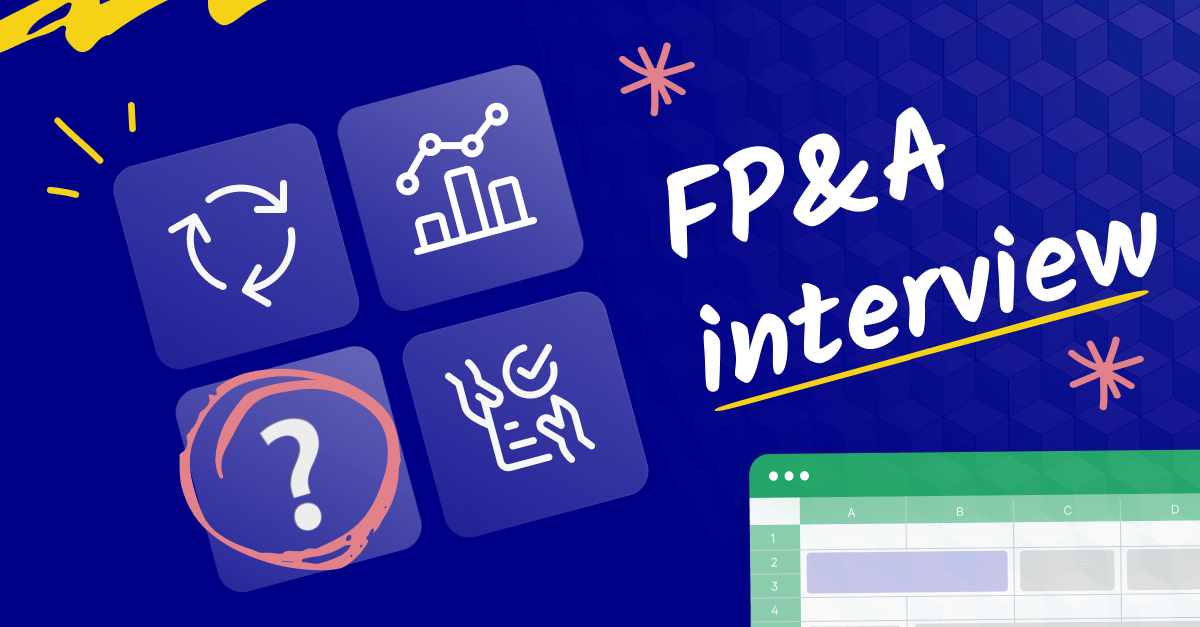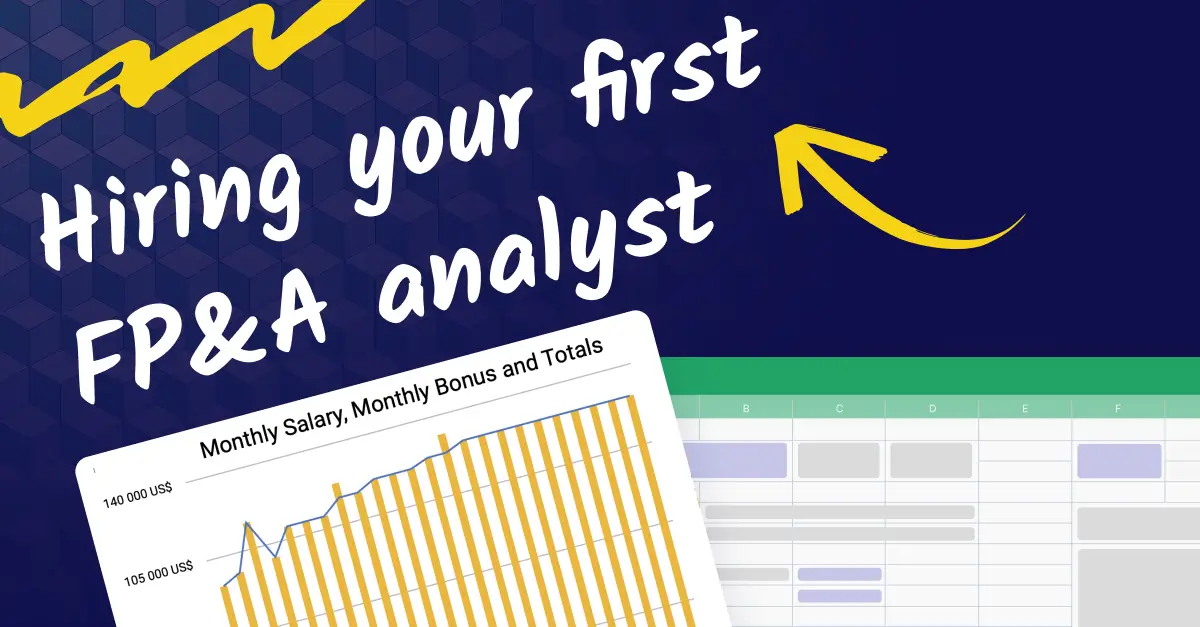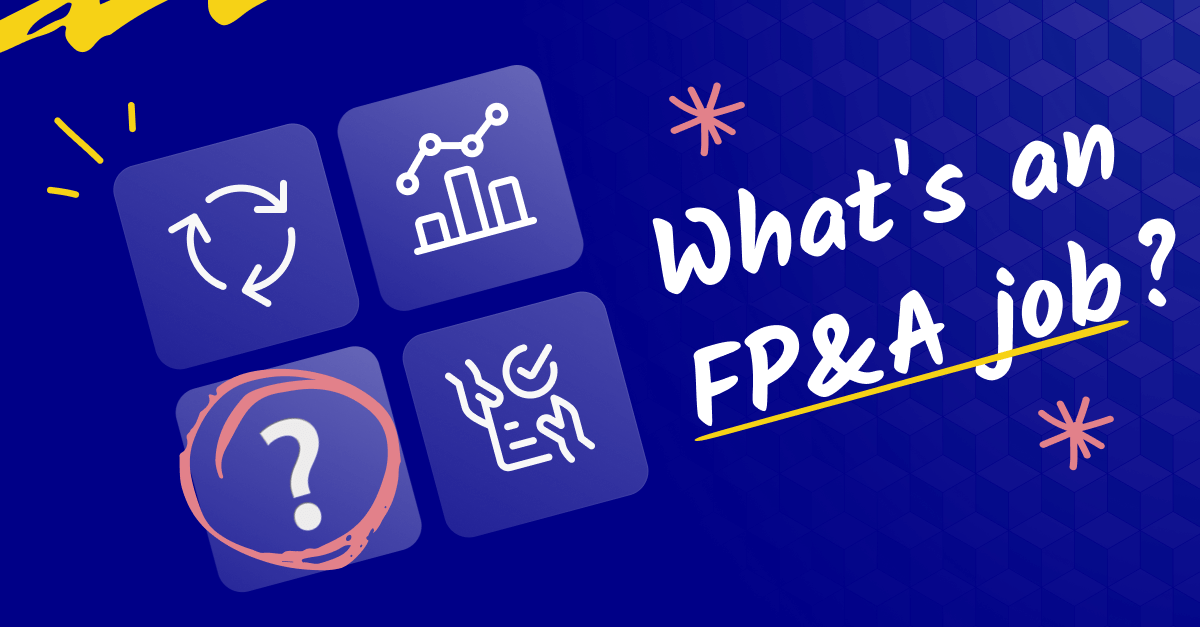FP&A interview questions for interns
If you want to know how to break into FP&A with an internship or an entry-level position, the secret is to find ways to demonstrate the skills necessary for the role. While you may have limited FP&A experience, you can still find ways to demonstrate your analytical, presentation, and communication skills in applicable ways.
How will your educational background aid you in this internship?
Be prepared to discuss your current coursework. This is especially important if you are looking for strategic finance internships from outside of a finance or accounting curriculum. Give examples of how analytics and critical thinking integrate into your classes.
Why pursue an FP&A internship versus accounting or another discipline?
Are you interested in business or accounting but exploring planning and analysis as part of your major? Be specific about why an FP&A job interests you. Share examples of your interest in planning and analysis, as well as showcase any cross-applicable skills.
How strong are your Microsoft Excel skills?
Strong skills are a huge benefit when working within a Finance organization. Although many FP&A software tools exist, many professionals still prefer to work within spreadsheets for much of their analysis. Having advanced chops in Excel is a valuable skill.
Tell me about “X”
You're expected to know the basics of what financial analysts do and the types of financial statements you'll encounter on the job. Be prepared to talk about core concepts like:
- Creating a simple financial model
- Cash flow
- Capital assets
- Capital expenditures
- Fixed and variable costs
- Operating expenses
- Assessing a company's current financial position
- Financial planning
- The qualities of a good Excel model
- What about accounts payable?
- What are accounts receivable?
- What is non-cash working capital?
It's always a good idea to come prepared with an analysis of the company's market share based on the data available to you. For example, even though you don't have access to that company's historical data or last year's revenue, you can talk in hypotheticals.
Presenting potential scenarios shows a thorough understanding of market dynamics and possible outcomes, which helps you tackle FP&A interview questions even if you don’t have specific data to hand.
FP&A analyst interview questions
At the analyst level, you're expected to be proficient at creating a financial model from a budget and manipulating financial data. You should be able to talk about how models interact with each other and you’re expected to understand the core essentials of financial planning.
Here are some typical FP&A interview questions you should expect to be asked when going for an analyst job.
Explain the three financial statements: the income statement, the balance sheet, and the cash flow statement.
These three financial statements are foundational to understanding a company's financial health.
The income statement, also known as the profit and loss statement, addresses the company's revenues, expenses, and profits over a specific period. This is an accurate representation of a business’s operational efficiency and profitability.
The balance sheet, on the other hand, is a snapshot of the company's assets, liabilities, and shareholders' equity at a particular point in time, showcasing what the company owns and owes.
Lastly, the cash flow statement tracks the inflows and outflows of cash, categorized as operating, investing, and financing activities. This statement highlights how well the company manages its cash flow to meet its financial obligations, so being able to explain it clearly is critical for interviews.
Please interpret this model and explain its effect on a company's cash flow.
A surface-level understanding of what is happening in a model is good, but successful candidates for FP&A analyst jobs need to interpret what they see and explain the impact it will have on the company's cash flow.
A good place to start is by examining the assumptions and inputs used in the model, like revenue growth rates, expense projections, and capital expenditure plans. These elements directly affect the cash flow from operating activities. Then, look at the timing of cash inflows and outflows, as well as any financing activities like debt issuance or equity financing.
A well-constructed explanation should provide insights into potential cash flow challenges or surpluses, which allows the company to make informed decisions about investments, debt management, and dividend policies.
Ultimately, you should make it clear that you know which actions are likely to be possible and where you need to cut back to maintain liquidity and financial stability over the forecasted period.
What do you consider your biggest weakness in terms of FP&A?
Most candidates are happy to showcase their strengths during the interview, so this question creates opportunities to see how they talk about their less-developed skills and areas of expertise. This question also allows an interviewer to see where skill gaps might appear and what enrichment opportunities might be helpful to the successful candidate.
Remember that because FP&A degree programs are few and far between, most FP&A training is on the job. This is a good time to talk about the circumstances of your current or previous positions and what you never got to work on. If you were never able to model operating expenses or create a forecast model because your team was highly segmented in terms of responsibility, you should talk about how you'd like to learn those skills in this new position.
If you're applying to work at a company with a new type of revenue model or offer, there's a lot to talk about here. If your previous company was SaaS but your new company has warehouses of products they sell, you'll encounter new questions that you previously didn’t have to answer, like "How does inventory write-down affect cash flows?"
Tell me about a time you disagreed with a boss or other superior.
Complex financial modeling may present opposing viewpoints about how to move forward through a challenge. As an analyst, part of the candidate's job will be communicating and educating on their analyses.
The best candidate will have the analytical skills to produce accurate analysis, confidently propose solutions, educate on the facts of the situation, and act as a strategic partner up and down the organization.
It's important to have a well-thought-out answer to this question. Spend some time before your interview thinking about how you'd approach this if asked.
Have you ever worked on a project that failed? How did you handle it?
It’s often said we learn more from our failures than our successes. This question allows the interviewer a window into your thought process when things don’t go as planned.
Explain the process you used to arrive at your conclusions, any circumstances affecting the outcome, and what you took away from the experience.
What do you think is the most desirable quality of an FP&A analyst?
There are many answers to this question, and whichever you pick will reveal something about your perception of the FP&A role. Analytical ability is an essential prerequisite for analysts, but creative thinking and problem-solving are also valuable. Presentation skills are another vital aspect, allowing you to communicate your results and recommendations clearly and effectively.
Project management skills, leadership, and communication skills are other avenues to consider in answering. Your answer to this question will give your interviewer a window into your potential skill fit and culture fit with the company.
What should you do if you find issues with a financial model or forecast?
This could be a question about technical skills or soft skills, and answering both aspects will provide valuable insight into your work style. Ask for specifics about the issues and use any detail the interviewer provides in forming your answer.

FP&A interview questions for a manager role
At this level, you should understand how to model revenues and assess future business needs and be able to assess both internal and external challenges facing a business.
Likewise, at the manager level, you should expect to lead a finance team. You should also have opinions on the overall strategic direction for FP&A—your FP&A philosophy, as it were.
What are the most common challenges FP&A departments currently face?
This question provides a broader context for your finance knowledge within the wider world. It shows that you spend time researching the economic and global impacts on businesses and demonstrates that you possess an interest in the subject beyond the technical functions of the job.
How do you communicate with stakeholders who have limited finance knowledge?
Finance professionals in a modern business environment must be educators. Translating detailed information into a usable format for many different audiences is an important skill. Many finance professionals invest time and resources in expanding their communication skills along with their analytical skills for this reason.
Demonstrate to your interviewer that you can communicate effectively across the organization and to internal and external audiences.
Can you tell me about the biggest challenges we face as a company currently?
Like the question about general FP&A challenges, this question is a chance to demonstrate your deep understanding of the finance function. In this case, you’ll also demonstrate that you’ve done your homework about the company and its financials. This question serves as a check against your interest in the role, as well as your communication and analysis skills.
Be sure to talk about both internal and external challenges in this answer. Not only should you do your best to evaluate future business, but you should also talk about the company's market share and its trajectory for growth.
Being able to create hypotheses without access to historical data and draw conclusions about external challenges based on what you can observe in the market shows you're a smart candidate. It'll take you far in the interview process.
How would you describe your management style?
Finance managers must be able to guide and support their analysis team throughout their careers, providing guidance, mentorship, and leadership.
Discussing your management style in specific allows the interviewer to visualize how you will fit within the larger organization. It also demonstrates your ability to navigate interpersonal relationships, provide balanced leadership, and work as part of a team.
How do you engage employees in your process?
Like management style, your ability to provide guidance and enrichment for staff is a vital part of the team's health. Discuss your views on peer leadership, skip-level management and mentorship, career road mapping, and advancement opportunities.
Before your interview, share specific examples of how you have implemented mentorship programs or created clear career paths to motivate and retain team members.
Employers will want to know how you build a culture of compliance within the finance function, and how you make sure the FP&A team has a seat at the table in the broader organization. If you’ve run any initiatives to improve collaboration and communication between departments, highlight them in your interview.
FP&A interview questions for FP&A directors and higher
Once you get to the level of a director, you are expected to have a deep understanding and extensive experience in financial modeling and revenue forecasting.
You’ll need to discuss both internal and external business challenges that you’ve faced, and show an authoritative understanding of current market trends, the landscape of your industry, and impacts from the wider world.
Covering all the conditions needed for a managerial position, you should also have a track record of cross-company success, such as building a relationship between HR and finance.
Name three challenges facing our company right now.
FP&A directors need to have a granular-level understanding of the company they’re going to work for, and if they come to an interview unprepared, that’s not a great sign. Interviewers may ask you to discuss challenges that the company is currently facing to test your understanding of the organization’s position.
Of course, you’ll need to go a step further and explain what measures you would put in place to address the issues. The best responses will cover internal and external issues and show strategic thinking, market awareness, and preparedness to solve complex challenges.
If you were CFO of our company, what would you want to change?
This is a classic question in FP&A director interviews since it evaluates your strategic vision and understanding of the company’s current operations simultaneously. Prepare well and use it as an excuse to showcase your ability to identify areas for improvement and prioritize initiatives that drive growth and efficiency.
The hiring team want to know that you can contribute to the company's long-term success and align strategic finance with broader business objectives. Therefore, you should show how well you understand the company's vision and the scope and limits of a CFO’s power, as well as the best practices in the FP&A space.
How do you align financial goals with overall strategic goals of the business?
Explaining how financial goals are intertwined with overall strategic goals shows that you have a deep understanding of how the entire business works—not just the FP&A department. The C-suite will want to know they can rely on an FP&A director who thinks on a broad, long-term scale, rather than siloing their team and focusing solely on their own results.
As opposed to accounting executives, FP&A play an active role in planning for the future of the company. Therefore, you should show a good understanding of the CEO’s role and how FP&A efforts can be adapted to support executive decisions.
Discussions should revolve your understanding of strategic finance and how it plays into decision-making, resource allocation, and compromise.
What are some innovative approaches you have implemented or would like to implement in the FP&A function?
FP&A interview questions are all designed to get to know more about the way you think and your working style. The best way to gerner that information is by looking at your track record and asking about your plans for the future. Being able to answer confidently and convincingly is what could separate you from other candidates, so carefully consider what your answer could be in your preparation.
Be sure to go deeper than the “what” and explore the “how.” For example, if you’ve made reporting more efficient and accurate, was that by introducing new reporting software or by training your staff with FP&A courses? The more detail you provide, the more professional your response will appear to the hiring team.
What strategies would you employ to enhance the role of FP&A as a strategic partner within the organization?
What decision-makers are really looking for here is your ability to elevate the FP&A function beyond its traditional place. You should address strategies such as how to improve collaboration and communication, as well as how to integrate FP&A insights into broader business decisions.
As well as the financial strategic thinking, you’ll need to show the impact that technology can have. To take an example, integrating your budgeting software with a CRMs like Salesforce allows you to incorporate customer behavior in your forecasting. This adds another layer of analysis—and therefore accuracy—to work from as you write up budgets.

FP&A technical interview questions
Showcasing your expertise in these areas will highlight your readiness to contribute effectively to the company's financial planning and analysis functions.
Acing the technical questions allow interviewers to evaluate your proficiency in financial analysis, modeling, and forecasting. Your answers will hopefully assure the hiring team about your technical skills, attention to detail, and ability to handle complex financial data, which are essential for the role.
Without these questions, FP&A managers would be taking a gamble on new recruits, which could mean expensive and time consuming training sessions.
What planning tools and platforms are you familiar with?
While you can pick up platform skills on the job and familiarize yourself with them before the interview, it’s always nice to have some knowledge of the tech stack. Be prepared to discuss your level of familiarity with financial planning and analysis software.
Check the job description for any required systems and be prepared to discuss them. It's always a good idea to familiarize yourself with the most common FP&A tools on the market, including:
As well as the common ERP systems:
Even if you've never used these tools, demonstrating that you're familiar with their relative trade-offs will go a long way toward appeasing the hiring manager.
What are the three financial statements and their importance?
The ability to clearly define the income statement, balance sheet, cash flow statement, and their interaction is table stakes for most FP&A roles. Be prepared to demonstrate your knowledge of how these essential documents come together.
You should also be ready to discuss how these financial statements are used to create financial reports, forecast revenues, and report on a business's financial performance.
To see financial statements in context, you should expect to talk about topics within statements, such as shareholder equity in balance sheets.
P.S. Bonus points for covering the fourth financial statement too.
What forecasting techniques have you had experience using?
As with the financial statements, you should have a clear understanding of forecasting techniques: their uses, strengths, and applications. Likewise, take time to share your understanding of top-down versus bottom-up models of forecasting.
Showing you have a broad and deep computational skill set will set you apart from candidates with less specialized skills.
How do you record PP&E, and why is this important?
Handling changes in fixed and long-term assets in the balance sheet requires appropriate calculation and care.
Demonstrating knowledge of proper classification and management of PP&E assets, knowledge of depreciation, capital expenditures, repair, and replacement, etc. demonstrates your proficiency in dealing with these items on the balance sheet.
How do you create a rolling forecast?
Versatility and a ready toolbox of techniques are essential for FP&A professionals at every level. Possessing the technical knowledge to construct a rolling forecast shows that you can adapt your approach to the company's needs.
Communicating this information to your interviewer shows that you have both the technical grasp and the communication skills to work effectively in the department.
What are the qualities of a great FP&A financial model?
Anybody can look up what an FP&A financial model should include ten minutes before their interview and give a convincing answer. However, interviewers probe into more detail by asking what a great model is, which you can only answer if you have genuine experience working with them.
Your answer should give the hiring team confidence that you can create robust financial plans and that you can quickly switch to plan B if plan A doesn’t work.
Questions to ask during your FP&A interview
Interviews are a two-way street, and if you don’t ask any questions, it could be interpreted that you’re not overly excited about the job. Here, we’re going to look at some questions that will help you get a better understanding of the company you’re applying for and what they expect from you.
What are the biggest challenges currently facing the FP&A team?
Somewhat generic, but a great starting point—if you know the current challenges, you can gauge the complexities of the role and the support you can expect. It shows that you’re ready for a challenge and you’re already thinking about how you can help. Within the interview itself, asking about the biggest challenges can be a springboard for more detailed conversation.
How does the FP&A team interact with other departments within the organization?
Asking about interdepartmental interactions shows that you know how important collaboration is to the role. The answer will help you understand the communication dynamics and the extent of cross-functional teamwork expected of you.
This question also reveals the company's culture and how integrated the FP&A function is with broader business operations.
What tools and software does the FP&A team use for financial modeling and analysis?
Knowing the tools and software used by the FP&A team probably won’t be a dealbreaker, but it at least shows you what technical environment you will be working in.
Discussing specific technologies shows you’re serious about working with the company and thinking in fine detail about the day-to-day work. Even if you’ve never heard of the specific platform before, you can use this as an opportunity to show that you’re willing to learn and adapt.
Can you describe the career progression opportunities within the FP&A department?
Inquiring about career progression suggests you’re thinking long-term and interested in growing with the company. But it’s not all about pleasing the hiring team. You need to know that you have a future at the company and will be rewarded for loyalty.
If you don’t have one already, write up a career plan and check if the FP&A jobs you’re applying to align with it.
How does the FP&A team contribute to the overall strategic planning of the company?
Even if you’re going for an entry-level role, discussing strategic planning shows you’re invested in the company’s success. For more senior roles, this is a starting point for more detailed discussions about strategy and relationship-building if you haven’t already covered them. If you have any cross-departmental skills, now would be a good time to bring them up to show the added value you can bring.
What qualities do hiring managers look for in FP&A candidates?
While you're expected to know the basics of financial planning, financial modeling, and other ways to determine a company's financial health, the best candidates have a suite of soft skills in addition to their technical knowledge.
Let's take a look at some of them.
Problem-solving and adaptability
It’s rare in FP&A that you can follow your own plan to the letter. External factors and organizational goals may close doors you wish were open, so you need to be able to compromise and come up with a backup roadmap. In industries that are constantly evolving, this agility is essential for companies to ride the wave of changes instead of drowning beneath it.
It’s not uncommon for hiring teams to set tasks in the interview process. Sticking to standard best practices may be a good approach for analysts, but as you climb the hierarchy, you should start to show a bit more original thinking.
Communication and presentation skills
Finance professionals don’t hide behind their spreadsheets. In the modern finance organization, analysts and managers must be skilled communicators. They must be able to communicate ideas, collaborate with other leaders on solutions, educate decision-makers, and gain consensus on a course of action.
Good presentation skills can be the difference between getting an ambitious budget approved or boards opting for a safety-first approach. Therefore, the best communicators tend to implement their initiatives and rise to the top positions more easily.
How you present yourself throughout your recruitment process will give employers a good understanding of how you perform on a day-to-day basis.
Openness to new technologies
As new software brings about fresh solutions and faster ways of working, FP&A professionals need to be open to trying out technology as it arrives. Resistance to new ways of working will drag a team down, while departments that embrace change will reap the benefits.
The other side of the coin is that FP&A managers need to be able to sell new approaches. This involves knowing the product inside out and providing training that is engaging enough to get employee buy-in.
Cross-functional skills
Managers often seek cross-functional skills in well-rounded candidates who can understand business challenges from multiple perspectives. This broad mindset helps finance experts to consider a range of viewpoints as they create budgets, which helps them work more effectively and build a more united team.
Dig into the strategies and benefits of interdepartmental understanding by streaming our webinar on building strong relationships across your organization.
Curiosity
Curiosity is a defining characteristic of a high-quality FP&A candidate—people who always need to know “why.” They tend to provide more thorough and accurate analyses, and can often spot potential issues before they snowball out of control.
Curious people are always on a quest to learn new skills, which bolsters your team’s potential. Finally, they usually research success stories and failures, which both help when their team hits a sticking point.
Interviewers might test your curiosity by bringing up a niche industry trend. Unfortunately, there’s little you can do to prepare for this apart from regularly exercising your curiosity.
Creative thinking
Hiring managers look for candidates with creative thinking skills as much of financial planning and analysis requires unorthodox thinking and workarounds. FP&A is in constant flux due to environmental factors, market trends, budget constraints, and more, so creative thinkers who can come up with innovative solutions are in high demand.
You can show off your creativity in an interview by explaining past instances where you’ve come up with a unique approach. Any breakthroughs that have improved processes or your bottom line are highly valued.
Business acumen
For FP&A professionals to be most effective, their skill set needs to stretch beyond their department. Strong knowledge of the goals and concerns of marketing, sales, and human resources teams is essential for in-depth planning and forecasting. With so many moving parts, you need to know that by prioritizing one area of your organization, others will suffer.
Understanding the interconnectivity of your business—and being able to communicate diplomatically—is an absolute must-have for FP&A directors and CFOs.
How to prepare for an FP&A interview
Although lower-level roles focus more on technical skills, while higher-level positions are concerned with strategic thinking and leadership skills, there are some common preparation practices whatever your seniority.
1. Research the company
Do a deep dive on the company you’re applying to, starting with its history, mission, and values. If there are any recent financial reports or news articles, you can glean some exciting talking points that are still current.
Understanding the company doesn’t just help you secure a job, it will also inform you as a candidate if you really want to work at the organization.
2. Research market trends
Read up on the latest market trends affecting the industry to display your awareness of the broader business environment. Specific areas relevant to the company, such as emerging technologies, regulatory changes, or economic shifts are a great place to start.
This knowledge will help you discuss potential impacts on the company's financial strategies and how you can contribute to capitalizing on opportunities or mitigating risks.
3. Brush up on FP&A technical skills
Not sure you can remember how to turn data into a compelling story? Learn new FP&A skills and improve your current ones to stand the best chance of securing a role. Don’t take for granted that a course you did ten years ago is still fresh in your mind—spending a few hours a week on a refresher course can be a game changer for your applications.
For more junior roles, being able to demonstrate Excel skills is a massive bonus—even better if you know all the shortcuts and formulas that FP&A professionals use regularly.
4. Review your past FP&A experiences
Don’t rely on your memory to spring into action when you’re under the pressure of an interview. Take the time to get your career path, problems overcome, and success in order, and plan how you’re going to talk about them.
Employers want to be reassured that you’re the right person for the job, so make sure to apply these experiences to the potential needs of your new role for maximum impact.
5. Practice with mock interviews
Friends, mentors, or professional coaches can simulate an interview environment and give you actionable feedback. As your volunteer to focus on both technical and behavioral questions and film it on your phone to look back at yourself as a third person. Similarly, practicing in a realistic place helps to prepare you for the in-person interview.
Ace your next FP&A interview
Consider the above questions, spend some time practicing your answers (to yourself or with a mock interview helper), and you’ll be well prepared to step into a financial analysis role you’ll love.
Hiring for an FP&A position or need help finding an FP&A job?
Check out our Slack community full of FP&A pros.



.png)










![FP&A team structure, responsibilities, and how to scale [2025]](https://www.cubesoftware.com/hubfs/budgeting-best-practices%20%281%29-1.webp)